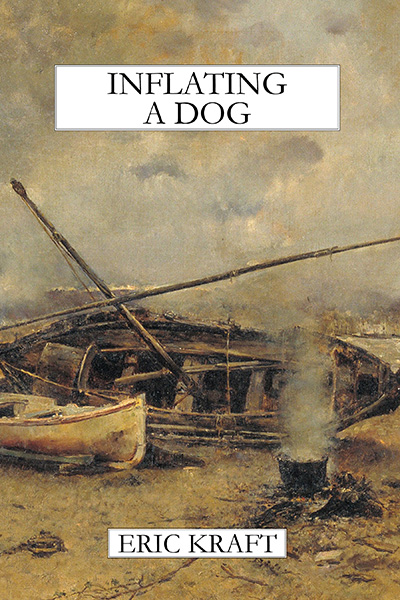
Cover image: Joan Roig i Soler: Sitges Study (circa 1896, detail)
| The Babbington Press (2018) 254 pages $ 24.95 |
||
| The Babbington Press (2012) 254 pages $ 16.95 |
||
| DIGITAL EDITIONS | Kindle $ 5.99 Apple Books $ 5.99 Nook $ 5.99 |
Inflating a Dog
(a sample)
Chapter 1
On Being a Bastard
BASTARDY has been good to me. I don’t actually know that I am a bastard, but I’ve tried legitimacy and I’ve tried bastardy, and, on the whole, bastardy has been more rewarding.
For one thing, bastardy gave me the inspiration for the first doo-wop song I wrote, although, because it was a subtle piece of work for a kid my age, no one but I noticed that it was about bastardy. It began like this:
Woh-oh, woh-oh-oh-ohhh,
There’s a space between
What you say and what you mean.
And it went on like that for quite a few lines before ending like this:
Woh-oh, woh-oh-oh-ohhh,
There’s a space between
Who I am and who you say I am.
Woh-oh, woh-oh-oh-ohhh,
That’s where the shadows fall.
Woh-oh, woh-oh-oh-ohhh,
And where the shadows fall,
Anything can happen
Anything at all.
Woh-oh, woh-oh-oh-ohhh,
Bah doobie doo wah.
I sang it to Patti Fiorenza one afternoon when I was walking her home from school. Patti was not the sort of girl who blushed easily, but I thought I saw the color rise in her cheeks as I sang, and I interpreted the cause of her coloring as embarrassment, arising from her recognition of the theme, a controversial one at that time.
“What do you think?” I asked.
“I think, um, I think there’s too much ‘woh-oh, woh-oh-oh-ohhh,’” she said.
“Really?” I said. I didn’t want to argue with her, though I disagreed with her. In the entire song “woh-oh, woh-oh-oh-ohhh” accounted for only fifteen lines out of forty, not too many at all.
“Yeah,” she said, “and—” She seemed reluctant to go on, and this time I was certain I saw her blush.
“That’s okay,” I said. I touched her hand. “You don’t have to say anything else.”
“It’s just that—I—I really think I should tell you that—you really can’t sing, you know?”
The adorable little thing. The song apparently embarrassed her so much that she couldn’t even bring herself to admit that it embarrassed her.
“Well,” I said, seizing the opportunity that she had given me, “in that case, why don’t you sing it? Why don’t you sing it with the Love Notes?”
Eventually she did, after some rewriting that cut six “woh-oh, woh-oh-oh-ohhh” lines, and it became popular enough at high school dances that soon most of Babbington knew—in a subtle, almost subconscious way—that I considered myself a bastard.
Hasn’t every boy everywhere at some time wondered whether he might be the child of some man other than his declared father? I think so. At some time or other, I think, every one of us suspects either that the beer-swilling Yahoo sitting in the living room watching television, the one who claims the perquisites of fatherhood, he who must be obeyed, must be a fraud, a usurper who has ousted our real father from the nest, or that the poor sap drowning his sorrows with beer and old jokes must have been defrauded, must be a cuckold, and that our real father, a dashing figure, a rogue, a restless profligate, is out somewhere roaming the world making conquests and siring our siblings.
I certainly wondered whether that might not be the case in my case. Some nights, many nights, I would slip from bed, creep partway down the stairs, and sit silently there, where I had a view down along the length of the living room, and I would spend some time observing Bert Leroy in the flickering television light, looking for some sign that would convince me one way or the other, and though I never saw anything that constituted incontestable proof, just the sight of him sitting there slack-jawed and gaping was enough to send me back to bed shaking my head and asking myself, “How on earth could I be the son of that fool?”
We have only a couple of options if we want to alter our beliefs about our paternity. We can decide that we were adopted, or we can decide that we are bastards. I favored bastardy because it brought with it an illicit, romantic, and passionate history, a history far more attractive and desirable than adoption could have provided, with its official procedures and forms in triplicate. Choosing bastardy also seemed like a nice thing to do for my mother; not only did it improve my paternity but also her love life, inserting into her past a wonderful night when, with someone handsome and clever, she conceived me. Cue the moonlight, please. Woh-oh, woh-oh-oh-ohhh.
I began testing Bert, the man who claimed to be my father, by calling him “Dad,” with a pair of oral quotation marks that called into question his right to the title. He ordinarily called me Peter, but after a couple of weeks of “Dad” he began calling me “Son,” and I decided to think that he was confirming what I suspected. To my surprise, my relationship with him began to improve. I felt sorry for the guy, I guess.
Chapter 2
Dudley Beaker, a Hypothetical Father
ANY FATHER WOULD DO, any one but the one I supposedly had. I chose Dudley Beaker; by that I mean that, one afternoon late in June when I returned home from school full of thoughts of Patti Fiorenza and found my mother sitting at the dining room table alone, weeping, I chose to believe that my mother had chosen Dudley Beaker. “Why is she crying?” I asked myself.
I crept up to my room and tried putting two and two together. Deaths make people cry. How about the death of Dudley Beaker? He had been interred in the Babbington municipal cemetery without benefit of clergy just two weeks earlier. Dudley’s death and my mother’s weeping were sequentially appropriate—his death having preceded her weeping—and sufficiently proximate to suggest a relationship of cause and effect. (A little logic is a dangerous thing.)
Not many other people would have been weeping for Dudley. He had in his final years become embittered and snappish. He told anyone who would listen that he had wasted his life and had produced “not one single thing of value in the time allotted to me,” and insisted that his grave be marked with only the simplest and cheapest of headstones, bearing the epitaph de nihilo nihil. Even Eliza Foote, who had married him, hadn’t wept at his funeral, but my mother had, and now she was downstairs sitting alone with her thoughts or her memories, and she was weeping again, which surely proved something.
In the interest of objectivity, I should say that there might have been another explanation for my mother’s weeping: she had a few days earlier failed at an attempt to make ribbon candy on a commercial scale, working in the kitchen of our suburban house. That failure didn’t seem to me to be a sufficient cause for weeping, but, while I was recalling her attempt to make the ribbon candy and assessing it as a possible cause of her weeping, I remembered that I had observed something that lent support for the theory that Dudley Beaker was my actual father, because for a brief time while she was involved in the effort to make ribbon candy she had seemed to become someone different from the woman I knew, knew as “my mother.” I think I had seen some remnant of the girl she had been, someone easier in her attitudes toward life and toward herself, someone who nursed expectations of a better future, who allowed herself to hope. Most of the time, there was a deadness in my mother’s eyes, the blankness that comes with the expectation that nothing will make today different from yesterday or tomorrow different from today, but while she was working on the ribbon candy she had a twinkle in her eye, like the twinkle in the eye of a girl in love.
I began looking for that girl in old family photographs. I was immediately struck by how often Dudley appeared in those photographs. The fact that he had lived next door didn’t seem a sufficient explanation for his presence at so many of the Piper family occasions. I began examining the images of Dudley with as much interest as I examined those of the girl who was to become my mother.
To be able to imagine Dudley as my father, I had first to imagine that my mother found him sexually attractive. This wasn’t easy. I tried to see Dudley as my mother might have seen him, but it proved impossible. I stared at the Dudley Beaker I found in those creased photographs slipping their moorings in an old album, barely held in place by black corner anchors coming loose as the glue aged and dried, decaying into gripless dust, and I found a youngish man, not a bad-looking man, who was usually wearing a tweed jacket or a cardigan sweater and nearly always puffing a pipe, but I couldn’t see him as my mother might have seen him, couldn’t feel for him what she might have felt for him.
Instead, I began to be able to feel what he might have felt for her. I began to discover a private Dudley Beaker, a man who wore a mask of aloof sophistication to hide the ardor he felt for the dark-haired bobbysoxer who lived next door, a man who sat at home alone most evenings, wishing, wishing, wishing that the girl next door would come tripping gaily over to his house to ask for help with her homework. He must have wondered why she didn’t find him more attractive than high school boys, or at least more interesting, since they hadn’t his advantages of tweed suits and a college education.
I also discovered in those photographs an attractive young woman whom I had never met. (Imagine here the embarrassment of a boy of thirteen who has never thought of his mother in any but maternal terms, discovering that she was once an attractive young woman, and discovering that finding her attractive meant that she had joined the group of girls he found attractive, the group that included Patti Fiorenza.)
Had the twinkle that twinkles in the eye of a girl in love been in my mother’s eyes when Dudley Beaker was around? I couldn’t be sure. Had there been a twinkle in Dudley’s eyes when my mother was around? Yes. I saw it in those old photographs, and I seemed to remember it from personal observation, and that twinkle made Dudley a likely father.
|
|
|
|
|
|
|
|
|
|

|